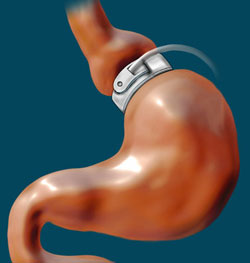According to the World Health Organisation, obesity has almost doubled worldwide since 1980. Recent studies show that almost a quarter of adults in England are classified as obese.
Living with obesity can be a real struggle and for many, losing weight can be a constant battle. If you are classified as obese, then you are putting your health at serious risk. You will probably have a number of ailments that are directly related to your weight, such as mobility problems, shortness of breath or diabetes. There are a number of cancers that have been linked to obesity and you are also at an increased risk of heart disease and stroke. It is highly likely that you are very unhappy about your physical appearance and may even be clinically depressed.
 It is a fact that diets do not work for everyone and some people need further intervention to help them regain control of their eating and their weight. Weight loss surgery is a great solution. A gastric band, for example, has many advantages compared to calorie counting alone and can really help you to succeed and change your life.
It is a fact that diets do not work for everyone and some people need further intervention to help them regain control of their eating and their weight. Weight loss surgery is a great solution. A gastric band, for example, has many advantages compared to calorie counting alone and can really help you to succeed and change your life.
Anyone with a BMI (body mass index) in excess of 30 is classified as obese. Your BMI is calculated by looking at your body fat in relation to your height. If yours is 30 or more, then you may be considered suitable for a gastric band.
A gastric band surgery is a silicone or rubber ring that is placed around the top portion of the stomach to create a small pouch. It is put in to place using keyhole surgery; so is relatively non-invasive compared to a number of other weight loss surgeries. When you eat, food passes in to the pouch before being slowly filtered in to the rest of the stomach. Because the pouch is a lot smaller than your stomach, you will feel fuller a lot quicker and this will reduce the amount you want to eat.
However, gastric band surgery should not be considered a ‘quick fix‘. It is a long term commitment and in order to realise the full benefits, you will need to make changes to your diet and eating habits. As long as you stick to your gastric band diet, you will feel full on fewer calories and this will have a huge impact on your weight. On average, those undergoing this type of surgery, lose between 50% – 60% of their excess weight within 2 years.
Gastric band surgery is fully reversible and also adjustable. Indeed, some patients have their band adjusted a number of times in order to optimise the effectiveness of the surgery and achieve maximum benefits.
As with all types of surgical procedures, gastric band surgery does have a number of risks and side effects. These include sickness and constipation, or problems with the connecting tubing. In rare cases, the band may slip.
Due to its position in the body, a certain amount of wear and tear of the band is to be expected. It is estimated that between 5% – 10% of patients will require additional surgery for problems related to the band itself (such as wear and tear), or for adjustments due to improper use.
On the odd occasion, tubing connected to the band can break or be punctured. This is very rare and recent improvements to the design are reducing this risk still further.
It is vitally important that you follow the instructions of your surgeon and diet team. Slippage of the band can occur if you try to eat too much and/or eat too quickly. Good placement of the band can help prevent this particular gastric band side effect, but remember, you will not be able to eat as much food as before and it is inadvisable to try!
Vomiting is a common gastric band side effect. This may happen if you are trying to eat too much or too quickly. As your body becomes used to less food and you become accustomed to eating more slowly, this should subside. If it continues or if you feel any pain, you should contact your appointed aftercare team for advice.
Another common gastric band side effect is constipation. Consuming less food will obviously result in fewer bowel movements and it will take time for your body to adjust. Keeping your body hydrated, as well as remembering to include good amounts of fibre in your diet, will help.
Problems such as sickness or constipation may sound unappealing, but then consider the risks of doing nothing about your weight. The risks associated with gastric band surgery are more than outweighed by the risk you face of heart disease or another potentially fatal illness.
Hypnosis has long been used to beat addictions of all kinds with varying amounts of success. Recently, there has been much talk about a form of hypnotherapy being used to mimic the effects of a gastric band, a virtual gastric band if you like. Hypnosis works by placing a ‘suggestion’ or ‘idea’ in the participants mind with a view to changing their behaviour. A number of people have claimed they have had huge success with this, but it does have its draw backs. For instance, not everyone is susceptible to hypnotherapy. It also relies on the skill of the hypnotherapist and the participant having a strong, positive mental attitude.
The benefit of an actual band as opposed to a virtual band is that as the former actually exists, it is physically impossible to eat excessive amounts of food as your stomach will no longer be able to accommodate it. With a virtual band, however, you will be relying on the strength of a ‘suggestion’ alone and one minor setback in your life could be all you need to break the spell of the hypnosis.
The risks associated with obesity are very real and the longer you delay some sort of positive action to tackle the problem, the longer you continue to be at increased risk of heart disease, diabetes and stroke, to name a few. People who have successfully lost weight with gastric band surgery are amazed by how quickly they start to feel better and regain a zest for life. By shedding that excess weight, you will have more energy; and problems such as snoring and breathlessness will be greatly reduced, if not cured altogether.


